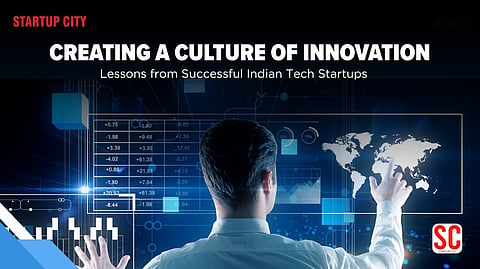

Let me start with a simple truth: innovation is no longer optional. It’s the heartbeat of every thriving startup. If you’re a founder, CEO, or decision-maker, ask yourself—is your team truly innovating, or just iterating?
In my journey working with Indian startups—from Bengaluru’s SaaS disruptors to Pune’s AI pioneers—I've seen one undeniable pattern: the most successful startups don’t chase innovation; they live it.
Let me show you how some of India’s most exciting tech startups are building a sustainable culture of innovation, and how you can replicate it.
A company’s culture isn't just about perks and ping-pong tables. It’s the invisible operating system that drives decision-making, creativity, and growth.
According to a Deloitte study, 94% of executives and 88% of employees believe a distinct workplace culture is crucial to business success.
So, what does that mean for startups like yours? Simple:
Innovation can't be mandated—it must be nurtured.
A culture that tolerates failure breeds experimentation.
Leadership plays the biggest role in modeling this behavior.
Let’s talk about Zerodha, India’s most profitable fintech startup.
Nithin Kamath didn’t build Zerodha by micromanaging. Instead, he gave his team a clear vision—disrupt brokerage fees—and the freedom to innovate around it.
“When people understand why they’re doing something, and feel trusted to figure out the how, that’s where innovation takes off.”
So as a founder, ask yourself:
Do my teams have ownership of outcomes?
Am I giving them room to test, fail, and improve?
Innovation and failure are two sides of the same coin. Just ask the team at CRED.
CRED’s founder, Kunal Shah, encourages first-principles thinking and public internal debates. He often shares failed product attempts openly on social media. This creates an environment where failure is a data point, not a death sentence.
Host monthly “Failure Fridays” where teams present what didn’t work—and what they learned.
“The biggest enemy of innovation is fear. Remove fear, and you unlock limitless ideas.” — Anonymous Startup Coach
Imagine this: Your tech team has a game-changing idea—but they don’t loop in marketing early. Weeks later, the idea collapses in execution.
That’s why companies like Razorpay swear by cross-functional squads. Each team is made up of designers, engineers, product managers, and marketers working towards a shared OKR (Objective and Key Result).
This flattens hierarchies and creates faster alignment.
Weekly standups with multiple departments
A shared Slack channel for innovation projects
Leaders model cross-team collaboration
In my experience, some of the most impactful startup hires aren’t Ivy League graduates—they’re curious generalists with a maker’s mindset.
Take the story of Freshworks. Their Chennai-based team actively sought out employees who tinkered with side projects or wrote blogs on product design. Why? Because curiosity compounds.
During hiring, ask: “What’s something you taught yourself in the last six months?”
That one question reveals more about innovative potential than any résumé ever will.
Not every innovation is a unicorn. In fact, many revolutions start with a small spark.
Zoho, for example, encourages its teams to suggest even the tiniest UI improvements or new onboarding flows. These “1% better” ideas, implemented weekly, have made a huge impact on user satisfaction.
Create a monthly “Idea of the Month” award—even for small changes.
Publicly recognize those who think differently, even if results aren’t immediate.
In the hustle culture of startups, creative thinking often becomes a casualty.
Swiggy’s engineering team blocks out weekly “No-Meeting Wednesdays” to let teams dive into deep work—whether it's solving a UI problem or building a prototype.
This ritual reduces burnout and increases actual innovation.
What if your team got 4 uninterrupted hours weekly to just think? No emails, no meetings—just space to explore.
This may sound controversial, but hear me out.
Data is crucial—but blindly following metrics can kill original thinking. Successful startups use data as a compass, not a leash.
Dunzo, the hyperlocal delivery app, runs experiments in stealth before looking at hard data. Why? Because intuition is the birthplace of disruption.
“Gut + Data = Disruption. Gut alone = Chaos. Data alone = Commodity.” — Startup Wisdom
You don’t need Google-sized budgets or a Silicon Valley address to build an innovation culture.
Here’s a quick checklist to kick-start change in your startup:
Set a bold vision and let your team own the “how”
Celebrate small wins and lessons from failure
Hire for curiosity, not just credentials
Cross-pollinate teams across departments
Make thinking time sacred, not a luxury
Creating a culture of innovation isn’t about setting up an “Innovation Lab” or hosting a flashy hackathon once a year. It’s about consistent, conscious behavior as a leader.
Imagine your startup a year from now. What if every team member felt safe to speak up, test wild ideas, and grow from their missteps? That’s where real, defensible innovation comes from.
You’re not alone if you’ve faced resistance or hesitation—most founders do. But the startups that choose to persistently nurture innovation are the ones that win in the long run.
So—what’s the first culture shift you’ll make this week?
Want more stories like this?
Explore our insights on Leadership Lessons from Indian Unicorn Founders and How to Build a Scalable Startup Team Culture.
Got an innovation story to share from your own startup? We’d love to feature it! Drop us a line at editor@startupcityindia.com